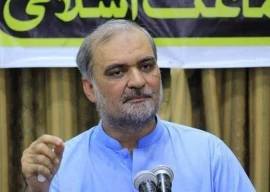
Barrister Farogh Naseem filed the case on behalf of Engro Corporation, praying that the Federal Board of Revenue (FBR) may be stopped from withdrawing group taxation relief. The SHC has granted an interim stay order.
Big businesses: Govt proposes amendments to income tax calculation method
In budget 2016-17, the federal government imposed restrictions on big businesses, limiting their relief in taxation on inter-corporate dividend income and the right to exchange group’s losses with profits of the subsidiaries. The proposal was aimed at generating over Rs4 billion in additional taxes.
However, the petitioners challenged only the withdrawal of relief in taxation on inter-corporate dividend income on the plea that the concessions cannot be withdrawn from those group relief schemes that had been registered with the Securities and Exchange Commission of Pakistan before June 30.
The FBR’s decision to change group taxation has been criticised by legal and tax experts and by Overseas Investors Chamber of Commerce and Industry (OICCI). Legal experts had feared that these restrictions may result in delisting of companies from capital markets and could compromise transparency.
The concept of group taxation and group relief was introduced in the Finance Act 2007 through amendments in section 59-B following a detailed study carried out by a Task Force led by the then FBR chairman. This was an important initiative for Pakistan’s taxation system and economy aimed at streamlining the group ownership structure and centralising the cross-company ownership structure to make the corporate sector internationally competitive.
Engro Corporation was one of the main beneficiaries of the relief. Its asset base increased from Rs49 billion to Rs196 billion in just eight years while its contribution to the national exchequer also rose significantly. The group taxation and relief reform enabled the creation of several group companies, resulting in their ability to raise capital on different balance sheets, strike sector-specific partnerships with foreign investors and de-risking of the banking sector through exposure to various sectors as opposed to one large entity.
Real estate set to win biggest tax amnesty
However, the FBR changed its policy from July this year and said that big firms were misusing this facility. Group taxation rules deal with taxing parent companies and their subsidiaries.
After the court’s interim decision, about a dozen other big conglomerates are also in the process of challenging the government’s decision, according to sources in the legal fraternity.
Due to withdrawal of exemption for inter-corporate dividends in a group structure for entities designated under group relief, the companies feared incidence of double and triple taxation on inter-corporate dividends. That means the companies will initially have to pay tax on their profits. When inter-corporate dividends are distributed, these are taxed again in the hands of the receiving company. They are further taxed on the distribution to shareholders of the parent company.
While objecting to the withdrawal of group relief, the OICCI had written to the finance minister in June this year that restrictions on the right to surrender losses within a group to the percentage holding of the group in the entity surrendering the losses, is not in line with the concept of group taxation under the international acceptable norms.
Although, the FBR was not expecting to get a big chunk, the court’s decision will compound its problems, as authorities are already struggling to achieve its monthly targets. In October, the FBR collected Rs194 billion in taxes until Friday. It needs another Rs66 billion before end of the month to hit the goalpost.
The FBR has already sustained Rs56 billion shortfalls in collection during July-September period and any further shortfall will make it difficult to achieve this fiscal year’s annual target of Rs3.621 trillion.
Due to legal lacunas, baseless tax demands near the close of the fiscal year, excessive litigation by taxpayers and weakness of the judicial system, about Rs316 billion tax revenues are stuck in courts at various stages.
Published in The Express Tribune, October 29th, 2016.
Like Business on Facebook, follow @TribuneBiz on Twitter to stay informed and join in the conversation.































1714024018-0/ModiLara-(1)1714024018-0-270x192.webp)










COMMENTS (5)
Comments are moderated and generally will be posted if they are on-topic and not abusive.
For more information, please see our Comments FAQ